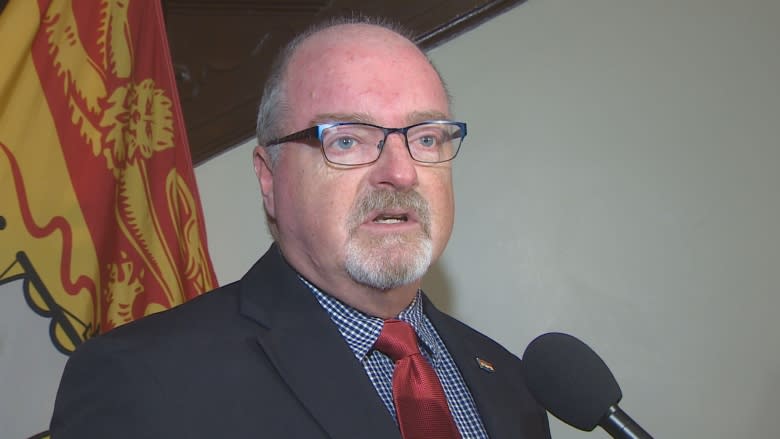New Brunswickers 'extremely concerned' about provincial debt, new poll suggests
New Brunswickers are concerned about the province's debt, a new poll suggests.
Sixty-one per cent of the 405 adults who took part in a recent survey by Corporate Research Associates rated their concern about the debt as an eight to 10 on a scale from one to 10, where one means "not at all concerned," and 10 means "extremely concerned."
Another 27 per cent of respondents put their concern between a rating of four and seven on the 10-point scale, while nine per cent rated their concern between one and three. The other two per cent said they did not know or didn't answer the question.
The province's 2017-18 budget projected the debt will hit $14.4 billion by the end of 2017-18, which is about $1 billion more than was forecast in last year's budget document for the end of 2016-17. That amounts to about $19,000 for every New Brunswicker.
Don Mills, chairman of the polling company, said there has been a lot of discussion about government debt across Atlantic Canada.
"It's a big issue," he said, adding that the majority of people surveyed "clearly has some concern about the level of debt in the province, it's a sizeable number."
Rate of growth concerns Coon
Government official did not return calls for a comment about the poll's findings.
Green Party Leader David Coon said the biggest concern about the province's debt has been the rate at which it continues to grow "while the premier has refused to do what the auditor general has repeatedly recommended, which is to set and then achieve targets for controlling and then reducing the debt."
Coon added that he's not sure whether some people may confuse debt and deficit. The deficit is a negative difference between what the government takes in from taxes and other revenues and the amount of money it spends on an annual basis. Debt, in its simplest explanation, is the total amount government owes through accumulated deficits over time.
"And certainly they cut the deficit in half, which is very good, we need to eliminate it, and I think that they are on track to doing so," he said. "But at the same time [Premier Brian Gallant] has not set targets to control and ultimately reduce the overall debt of the province."
He added the survey should have asked more specific questions and also provided people with more information on where New Brunswick's debt sits compared to other provinces.
Out of the 10 provinces, New Brunswick's debt per person was fourth highest in 2016-17 at $18,501, according to a report released last week by RBC. Newfoundland tops the list at more than $27,000 of debt per person, followed by Quebec and Ontario.
"It's important to put it in perspective," said Coon.
PCs push awareness
Bruce Fitch, finance critic for the official Opposition, said the poll shows people are aware and concerned about the debt, though he hopes the number of people with concerns will continue to grow.
"When more people are aware of that then they'll be pushing their MLAs to make some tough decisions," he said, adding that New Brunswickers continue to pay more taxes while the debt of the province rises.
"That's not sustainable long-term."
Now that the federal government announced more spending for daycare spaces and social housing in its new budget, the province will be forced to match that, which may increase the provincial debt even more, he said.
"That's a bit of a gift with a catch to it," he said. "Some of these programs are great to announce but the actual maintenance or application of them are another thing."
- Budget 2017: Liberals spend on training and innovation while holding line on most taxes
Fitch suggested the province take a closer look at some of its projects and consider alternatives on how to spend its money in the future.
Using the twinning of Route 11 between Shediac and Bouctouche as an example, he said "does it need to be twinned or could it just get another passing lane?"
Planning projects over multiple years makes the provincial budget tighter moving forward. And when you double your roads all over the province, "your maintenance budget goes up, too," he said.
Concern highest among older residents, anglophones
Mills said the CRA did not poll residents of Nova Scotia or Prince Edward Island, but it asked the same question to 402 people in Newfoundland, and found 46 per cent of respondents there also expressed extreme concern over their provincial debt.
The New Brunswick poll also found concern about the current provincial debt is lower in the north of the province. About 129 out of the 405 adults interviewed responded to the survey there.
Concern was highest among residents 55 years of age or older and among anglophone residents, which made up about 67 per cent of respondents, Mills said.
The poll was conducted over the telephone between Feb. 8 to March 1, 2017. The survey company said the results were accurate to within plus or minus 4.9 percentage points, 95 times out of 100.



